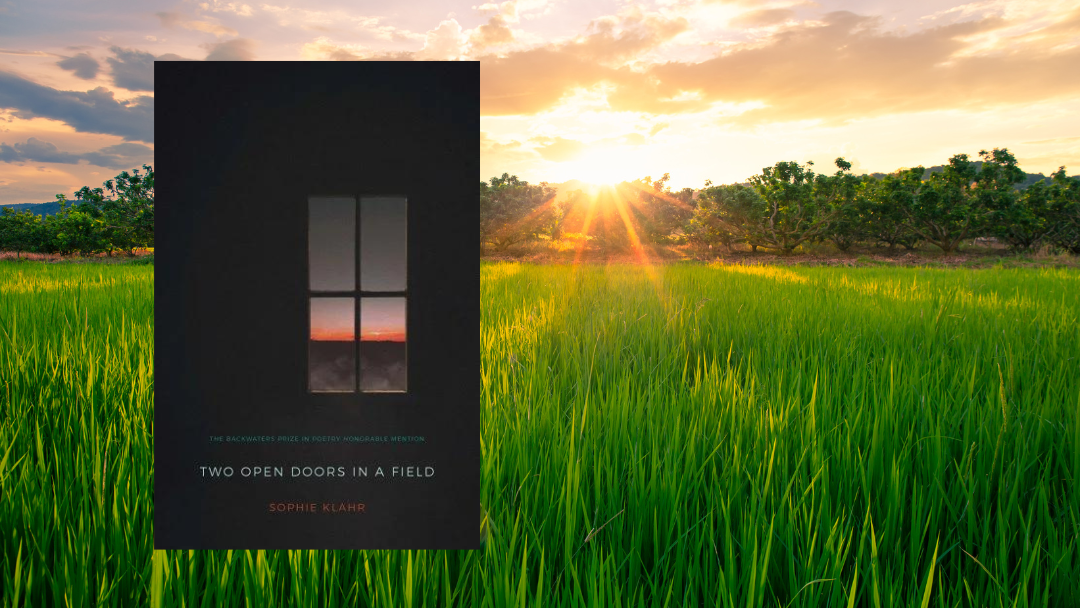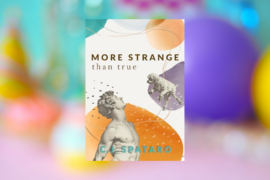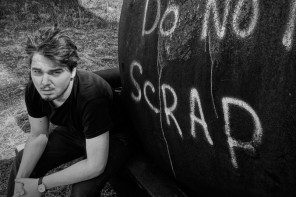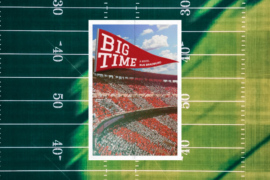S.T. Brant: Hi Sophie, thanks so much for taking the time with me here to answer some questions about your book. Congratulations on Two Open Doors in a Field, it’s an incredible work. There’s so much to talk about. To start with, I want to ask you about the genesis of this idea. The concept for this book centers around a pretty epic road trip you took, right? What was going on with this journey you were on?
Sophie Klahr: Hi! Thanks for your kind words, and for being curious about the work.
For three years, I didn’t live anywhere for more than 6 months at a time, looping back and forth between urban California or rural Nebraska. I’ve tried to calculate the distance I drove alone during those years – it’s somewhere around 14,452 miles. Eventually I spent less and less time in towns or cities, which the book ended up reflecting: rural Nebraska became the lodestar of my life.
In transit, I stayed in rundown motels (where you go into your room during daylight and plan to not come out until morning, or sometimes sleep in all your clothes, never getting under the sheets), but in New Mexico I always stayed with an older cousin, a weaver, who had raised her kids off the grid in the ‘70s. In Colorado, I always stayed at The Windsor Hotel in Silver Plume – a slowly sinking bed and breakfast in a tiny town broken by the interstate. The most upscale spot I ever stayed at was The Red Garter, a casino hotel in a town which sits on a peak at the edge of the salt flat Half the town is Utah (Wendover) and half Nevada (West Wendover)—the casinos are cozied up to the state line. You can walk through the whole town in 15 minutes. Most colder months I spent in either the Bay Area or Los Angeles, and once in West Texas for a few months, as where I lived in Nebraska wasn’t exactly weatherproof. A glass of water at my bedside froze overnight there one late fall, and I headed west again soon after. But by the following May, I was back… so… definitely a journey. Not so much a road trip.
STB: And when on this journey did you start writing, and when did the idea to turn these writings into a collection pop into your head?
SK: It was Wordsworth-ish in a way, how he says poetry “takes its origin from emotion recollected in tranquility.” Though I don’t know if “tranquility” is quite the word for the space of recollection I live in when writing. Haven’t found that word yet.
I wrote the first sonnets the first fall I was looping between living in California and Nebraska, a drive which took four or five days depending on if I was going towards the Bay or towards Los Angeles. Essentially, my transitory lifestyle those years lent itself to assemblage; most of the poems are, in some way, about being in motion – this book is the result of actions collected.
STB: You note in the Notes section of the book that many of your first impressions were taken on as a voice recording while driving. This creates a great conversation about what writing is, which is such a vexing question. It’s really a question that writers love, I feel like, because there’s so many different ideas about what ‘writing’ actually is. Is it the act of writing, is it thinking about writing, etc. For you, is there always an intentionality to writing for you?
SK: 18 of the 25 sonnets in this book have the word “Listening” in the title, following a formula of “Driving Through (fill-in-the-state), Listening to the Radio.” There are hours of radio recordings and uncountable fairly incomprehensible voice-to-text notes—probably less than 1% of that content appears in the book. I don’t know why or when I started to record the radio, but surely it came from being alone sometimes for many days, with the radio as my only accompanying voice – I suppose the intention there was to find a type of company. I listened a lot to the program On Being, and many fragmented moments of thought from those who were interviewed by the host Krista Tippett—musicians, philosophers, scientists made their way into the poems. I also found dozens of local radio voices while driving through the west and midwest. Some hateful, some full of wonder, some very simple…
As to the particular question of what ‘writing’ is… Honestly, for me, If I don’t have a pen in my hand or my hands on a keyboard, I’m not writing. I don’t physically sit down to write poetry unless I have a sort of indescribable little tickle in the back of my head that says Write. So, the thing springs up on its own. And then once it has sprung, I get to choose whether or not to water it, whether or not to pay attention.
STB: That’s a really great metaphor to categorize your writing process, I think! You have these ideas or thoughts, but until you cross that threshold and put a pen in your hand, it’s all still preliminary; then, once engaged, certain ideas crop up and you can then work with them, ‘water them’, or let them fallow. That’s wonderful and interestingly asserts a real deliberative process and intention to your work. How ‘intentional’ do you feel that your writing is in general, as in, do you have an idea or a concept that will serve as the motivation for a writing session; or, when you get that tickle is the process somewhat spontaneous, and only after you’ve begun and are in the work itself do you attain some clarity and can then shape the direction of the work? So I guess it’s the age old question of what comes first for you, an idea (however simple or rough it is initially) or the actual writing of words, like a line or two whose vague beginnings don’t yet necessarily have a direction?
SK: It’s an interesting question, and trying to answer brings to mind a sort of odd psychological history I haven’t thought of; when I was in my teens and early 20s, whole lines of poetry frequently came to mind without much thought, fragments I’d write down and find a place for (or not find a place for) later. I think sometimes these lines had more to do with “nothing.” But for maybe the past 15 years or so, there’s some sort of Subject behind that tickling feeling, an itch related more specifically to an experience that I feel the desire to sort out. When random fragments come to me now, it’s more often a single word or pair of words (I remember recently writing down “family teeth” in my Notes app for some reason) or a something heard or seen outside that stuck inwardly. I have a friend who is not at all a poet or a reader (he repairs elevators, and is somewhat of a bodybuilder), but in his Instagram stories, he often writes fragments that I pull into my poems. The other day in an IG story, he wrote “I am considering the abandonment of all human language,” randomly overlaid on some reel about nutrition. I don’t know what direction that moment will go, or in what poem, but it is a moment I’m keeping.
STB: You do so much with the sonnet form in this book and add your name to the list of great contemporary sonnet architects. You’re so creative in the way that you make each iteration of it fresh but still tense and communal. The sonnet form has really undergone something of a revolution lately. Tell me about how the sonnet as the driving form was decided on; on top of that, I’d love to hear some of your thoughts in general about the sonnet.
SK: I’m so glad you like them! “Tense and communal” is a unique way of regarding that work. There is definitely a tension there. I have no idea why I started writing all of these sonnets, except that the tradition of the form embodies what I was actually doing in my life, and felt acutely: traveling in a set space with limited time. And, as one of my voltas goes: “There is always a turn, a last exit;” — to write these poems about traveling and listening.. I couldn’t conceive of them being written any other way.
I think the profusive embrace of sonnets we see ( I see the rise as a steady incline from 2015-ish to now) is a response to the undeniable instability of the present AKA the daily assault of disaster in our social media / news feeds, and our complicity in so many disastrous situations (whether by action or inaction)… maybe we, those drawn or newly drawn to form, want something to hold us; we want a place to hold things in a measured way, where we can step back to regard them for a moment; maybe we want an exit strategy, which one could say a traditional sonnet offers. That’s why the form is so perfect for writing about trauma – you only have to go Through It for 14 lines, and then you’re free. Well, “free.”
Frost says that poetry is a momentary stay against confusion – the traditional sonnet form, in its restriction and brevity (and, should you choose to embrace them, patterns of meter and rhyme), is a perfect articulation of that “momentary stay.”… It’s sort of like therapy: you open the door and there it is: a space to cry or scream or sing whatever you want in those four walls…
(I’m reminded of that line in Levis’ poem “The Double,” which starts “Out here, I can say anything,” but with the sonnet, this notion is flipped, becoming In Here.)
… And then, as quick as it began—the hour is up—the fourteenth line arrives—which you knew would be there when you entered the room. And it was part of why you entered, wasn’t it? To have that time you so desperately wanted, a time which you knew would end…
Did I answer your question?
STB:
Yes, very beautifully. I like how you connected the sonnet and your work with it to a door, going through it from a very constrained starting point to a freedom. It reminds me of the line in your long, central poem (the namesake of the collection) “Like Nebraska”, “This is how September ends- / They stand together at dusk,/ A little ways apart,/ Like two open doors/ In a field”. That’s an amazing image. The strangeness of the doors (are they doors disembodied of a house? Are they a metonym for a place abandoned? If they’re the former, what’s the significance of crossing the doorway from openness to openness- is the process of crossing a threshold symbolically meaningful enough in itself to invest the step with power? Etc.) gives the reader so many imaginative decisions, and then the idea that it’s these people who are the doors themselves, in this field, apart, yet somehow being doors and sharing the power that you invest the symbol of doors, so they’re intimate regardless of their space- it’s a truly spectacular poem. And a deviation, stylistically, in the book! breaking up sonneteering travelogue. I want to know about this poem, so I’ll ask you (broadly, I admit) for your overall thoughts on that poem now that it’s published and you’ve had some space from it. I’d love to know how you worked on it and the idea or story behind it.
SK: “Like Nebraska” began while I was reading nothing but “What About This: Collected Poems of Frank Stanford” – an immense and invaluable book. Each section of “Like Nebraska” begins with a simile to connect the central characters to their environment. Interconnectivity between speaker/see-er and environment is a core engine of this book, a sort of thrumming question and awareness that isn’t at all shy of making its presence known. One of the powers of simile is in its ability to snap our minds into the reality of how thin the divide between “us” and everything else you can speak of is. Stanford has a particular genius in similes (I often use excerpts from his poems when introducing the concept of similes to beginning poets); for a whole month, I would read a few pages of Stanford, and then looking outside to the fields I was living in at the moment—I could see how everything was like everything else, both delicate and sturdy, and vibrating with both collective and individual power, all particular likenesses offering description equally. As far as the rest – the story of that long sequence – I think I’ll let readers experience that woven ark on their own.
STB: Going back to your answer about the sonnet’s contemporary popularity, I think that was very insightful about the sonnet form as a stay against chaos, against instability. It shows that there’s a variety of possibilities for how writers respond differently to the times. Sometimes poets engage with things directly in the content of the writing, but as you noted, sometimes the formal elements are the confrontation with the world. That the form of a poem can be a political or rebellious act as much as the words of the poems.
(Not political solely as Political, but in the political-is-personal way, in that every decision in a poem is a statement). I was hoping you wouldn’t mind responding with some of your thoughts about this idea of form vs words as a way to engage and connect with things directly and indirectly.
SK: I’m not sure that I can address form versus words in that binary, because of course whether in capital F form or not, every poem has its form. During the years I was writing Two Open Doors in a Field, with all its sonnets, I was grappling with my queerness as an adult in a way that I never had before. And yet, queerness isn’t mentioned until “Pass with Care,” the final poem (a corona), and even then, only momentarily, and, along with some other identity markers: “white Jewish sober queer.” In retrospect, perhaps some of my embrace of the sonnet, with all its historical restrictions, had to do with that active personal investigation which I chose not to explicitly announce on the page.
When we, in 2023, choose to write in a poetic form that could be deemed historical, classical in a canon sense, that form is never one thing. Instead, it is an experiment, a tool of possibility. When I buy a pair of sneakers, I can use them to run, to dance, to walk, or deconstruct them if I so choose. And too, where or how I run or dance or walk in those shoes is determined by my weight, by my environment—the form I’ve decided to engage with takes on the particularities of my actual being. So too a chosen form of a poem is then affected by each writer’s particular tics of language, their proclivities as a writer, but it of course is also affected by that person’s actual self, with all its multitudinous identity markers.
When I enter conversations about poetry and politics, I always go back to Carl Phillips’ luminous essay “A Politics of Mere Being.” To quote Phillips directly: “How is it not political, to be simply living one’s life meaningfully, thoughtfully, which means variously in keeping with, in counterpoint to, and in resistance to life’s many parts?” Form and its politics are also of course in some ways inherently determined by the reader: we come to poems with our own histories, our understandings and curiosities, preoccupations and lenses. Someone could look at a poem of mine and see a sonnet and/or a queer sonnet, and/or a female-identified sonnet, and/or a Jewish sonnet, OR simply a poem that happens to be 14 lines long! Everyone understands a little differently from one another, and all of those understandings are equally valid; I look at my work as an artifact: once the poem is in print, my actual self doesn’t actually determine how it is read. In short, you can choose to do whatever you like with that particular pair of sneakers. It makes me think of Whitman, how he writes in ‘Song of Myself’: “you shall listen to all sides and filter them from yourself.”
STB: A required question that no writer is allowed to escape an interview without: what’s in progress for you right now, what’s in the works? Is there anything about, the sonnet, some element of language, etc., Two Open Doors… that you’re hoping to continue exploring in your future work?
SK: I seem to be writing things that look like prose at the moment, but who knows. I think I’ve been working on a prose poem chapbook… it’s about an angel, addiction, and the hypocrisy of the criminal justice system. That’s a poor summary; I haven’t decided how to frame that work yet. There’s a non-fiction / lyric memoir manuscript I picked up again recently on the topic of water, but because much of it is research-based (and therefore, due to subject, often painful) I’ve been writing it incredibly slowly. I do enjoy working on the manuscript though; it touches on everything from desalination plants and segregated water fountains to cetacean intelligence and the fact that my parents met because of a swimming pool…
I have a collaborative book coming out in October called “There is Only One Ghost in the World” (Fiction Collective 2), which I wrote with Corey Zeller… it won an innovative fiction prize but I like to think of its genre as being “A Secret Thing Thing.” It’s not in the works of course, but it feels like it is working its way into the world. ( *** Note: since the time of this original interview, the aforementioned book has since been released, and may be acquired here)
As far as hope… [ Laughter ] I don’t think I actually hope for very much, in general. I never thought I would live this long, so life itself feels like a surprise, with a lot of possibilities and paths. To pay attention, to be honest and kind and present—that’s what I hope for.
S. T. BRANT is a Las Vegas high school teacher. His debut collection Melody in Exile will be out in 2022. His work has appeared in numerous journals including Honest Ulsterman, EcoTheo, Timber, and Rain Taxi. You can reach him on his website at ShaneBrant.com, Twitter: @terriblebinth, or Instagram: @shanelemagne.
Like what you’re reading?
Get new stories, sports musings, or book reviews sent to your inbox. Drop your email below to start >>>
NEW book release
Direct Connection by Laura Farmer. Order the book of stories of which Mike Meginnis says there is “an admirable simplicity at their heart: an absolute, unwavering confidence in the necessity of loving other people.”
GET THE BOOK



